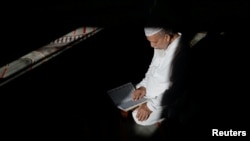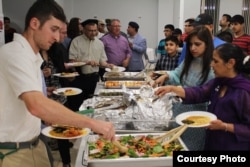Muslims around the world are preparing for the holy month of Ramadan, a period of fasting, reflection and communal gatherings, which starts Tuesday. Muslim-Americans of diverse backgrounds and national origins will gather in Islamic centers across the United States to worship and celebrate their faith.
Muslims in America observe Ramadan just like the rest of the Islamic world, with a set of traditional rituals. Families shop at Halal meat stores, prepare Iftar meals to break their dawn-to-dusk fasts with family and friends, pray together and help the poor.
Shaker Elsayed, imam of Dar Al Hijra Islamic Center in Virginia, which serves a Muslim community comprising 42 different nationalities, says the holy month is about unity.
“Ramadan becomes a very helpful opportunity to bring people together, those who come from different cultural and ethnic backgrounds and linguistic backgrounds. We all speak English so we use English as a unifying language, and at the same time, we do all the activities to accommodate everybody, especially in Ramadan.”
Shaker says the center provides Muslims free meals to break their daily fasts and organizes nightly prayers during Ramadan.
While Muslim-Americans are fasting during the day, they’re surrounded by non-fasting colleagues at work. For Egyptian-American Ibrahim Radi, that is not a problem.
“I have to fast because it is my religious duty, so it doesn’t matter what everybody else is doing,” says Radi.
However, his wife, Nadia, misses the big family gatherings in Morocco.
“There is a big difference; here you do not have extended families; so instead of having 10 people around the table, there is only the two of us.”
The work day can seem even longer for Muslim-Americans performing their religious duties during Ramadan.
For Amina Tanboush, who hails from Senegal, Ramadan is about fellowship.
“Everyone will cook some food and bring it, and we all eat together and pray together and we talk about [the] Muslim religion, teach each other, and at work, sometimes we go to pray together around lunch time,” says Tanboush.
For Muslim-American groups, Ramadan also has served as an occasion to educate the American public about the religious observance and the Islamic faith in general.
That includes open houses at local mosques and Islamic centers, public lectures on Ramadan, interfaith Iftar dinners and TV ads reminding the public that Muslims are an integral part of U.S. society.
Imam Shaker Elsayed says his Islamic center invites Christian and Jewish Americans to Iftar dinner every Wednesday as a way of interfaith dialogue during Ramadan.
Interfaith dialogue thrives during the month and helps to better understanding among followers of different faiths as Keith Ellison, the first Muslim-American member of the U.S. Congress, explains.
“It is certainly important dialogue for us to have; all people of all colors, all cultures and faiths need to come together to talk about points of difference so we can discover how are we unified,” says Ellison.
Since the early 1990s, U.S. presidents have issued Ramadan greetings each year to the more 1.5 billion Muslims worldwide.
Imam Shaker Elsayed believes the presidential greetings have helped to raise awareness among Americans about Ramadan.





